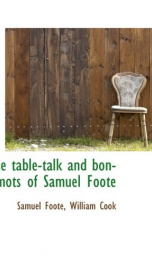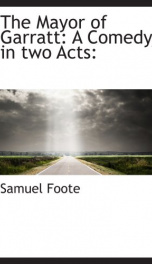Foote Samuel
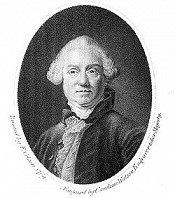
Samuel Foote (January, 1720 – 21 October 1777) was a dramatist, actor and theatre manager from Cornwall. Born into a well to do family,[1] Foote was baptized in Truro, Cornwall on 27 January 1720.[2] His father, John Foote, held several public positions, including mayor of Truro, Member of Parliament representing Tiverton and a commissioner in the Prize Office.[3] His mother, née Eleanor Goodere, was the daughter of baronet Sir Edward Goodere of Hereford.[4] Foote may have inherited his wit and sharp humour from her and her family which was described as "eccentric. ..whose peculiarities ranged from the harmless to the malevolent."[5] About the time Foote came of age, he inherited his first fortune when one of his uncles, baronet Sir John Dinely Goodere, was murdered by another uncle, Captain Samuel Goodere.[2] This murder was the subject of his first pamphlet, which he published around 1741.[6] Foote was educated at the collegiate school at Worcester, and at Worcester College, Oxford, distinguishing himself in both places by mimicry and audacious pleasantries of all kinds.[2] An undisciplined student, he frequently was absent from his Latin and Greek classes and subsequently, Oxford disenrolled him on 28 January 1740.[4] Although he left Oxford without taking his degree, he acquired a classical training which afterwards enabled him to easily turn a classical quotation or allusion, and helped to give to his prose style a certain fluency and elegance.[2] Foote was destined for the law, but certainly not by nature. In his chambers at the Inner Temple, and in the Grecian Coffee-house nearby, he came to know something of lawyers if not of law, and was afterwards able to jest at the jargon and to mimic the mannerisms of the bar, and to satirize the Latitats of the other branch of the profession with particular success.[2] Though he never applied himself to his studies at the Inner Temple, he well applied himself to spending money and living as a bon vivant which led to him quickly running out of money.[5] After finding himself in debt, Foote married a certain Mary Hickes (or Hicks) on 10 January 1741. With his wife also came a sizable dowry. Contemporaries note that Foote mistreated his wife, deserting her when his financial situation improved and Hickes may have died an early death.[5] But a stronger attraction drew him to the Bedford Coffee-house in Covent Garden, and to the theatrical world of which it was the social centre.[2] His extravagant living soon forced him into debtor's prison in 1742,[7] and friends encouraged Foote's going onto the stage to make a living.[8] Foote's first training for the stage came under the tutelage of Charles Macklin. By 1744, when they appeared onstage together, Macklin had made a name for himself as one of the most notable actors on the British stage, after David Garrick. His appearance as Shylock in Shakespeare's The Merchant of Venice at the Drury Lane Theatre in 1741, mesmerized London audiences. Dismissing the conventional comedic approach to the character, Macklin played the character as consummately evil. Following his debut, George II reportedly could not sleep while Georg Lichtenberg described Macklin's interpretation of Shylock's first line--"Three thousand ducats"--as being uttered "as lickerously as if he were savouring the ducats and all they would buy."[9] Following less than a year of training, Foote appeared opposite Macklin's Iago as the titular role in Shakespeare's Othello at the Haymarket Theatre, 6 February 1744.[5] While his first appearance was unsuccessful, it is noted that this production was produced illegally under the Licensing Act of 1737 which forbid the production of plays by theatres not holding letters patent or the production of plays not approved by the Lord Chamberlain. In order to skirt this law, the Haymarket Theatre held musical concerts with plays included gratis.[10] Following his unsuccessful London appearance, Foote spent the summer season in Dublin at the Theatre Royal, Smock Alley where he found his first success. Returning to England, he joined the company at the Theatre Royal, Drury Lane which at that time included such noted actors as Peg Woffington, David Garrick and Spranger Barry.[1] There he played comic roles including Harry Wildair in Farquhar's The Constant Couple, Lord Foppington in Vanbrugh's The Relapse and most notably, the playwright, Bayes in Villiers' The Rehearsal. It was in this role that Foote publicly showed his gift of mimicry. Borrowing from David Garrick's interpretation of the role, Foote used this role to mock many leading contemporaries.[11] Even with his success onstage, Foote remained impoverished.[11] Attempting life as a theatre manager, he secured a lease on the Haymarket Theatre in 1746.[12] Foote began writing in earnest, producing two pamphlets, A Treatise on the Passions and The Roman and English Comedy Considered.[13] After illegally producing Othello, Foote opened one of his own plays, The Diversions of the Morning or, A Dish of Chocolate, a satire on contemporary actors and public figures performed by himself, on 22 April 1747.[11][8] The Dish of Chocolate of the title referred to a dish or tea offered by Foote to accompany the musical entertainment while the performance was offered gratis, all done to avoid the Licensing Act. On the morning following the performance, the theatre was locked and audiences gathering for the noon performance (another gimmick to evade the law was to stage the show as a matinée) were turned away by authorities. Foote's jabs at other actors brought the ire of many at Drury Lane and the managers took steps to protect their patent. Fortunately for Foote, some highly placed friends at court helped the theatre reopen and the play continued. In June, Foote offered A Cup of Tea, a revision of his revue, Diversions, again in the guise of a culinary offering. After a brief trip to Paris, Foote opened The Auction of Pictures which satirized satirist Henry Fielding. A war of wit was launched with each lambasting the other in ink and onstage. Among the verbal missiles hurled, Fielding denounced Foote in The Jacobite's Journal saying "you Samuel Fut [sic] be pissed upon, with Scorn and Contempt, as a low Buffoon; and I do, with the utmost Scorn and Contempt, piss on you accordingly."[14] The Fielding quarrel was followed by a more serious quarrel with actor Henry Woodward. This resulted in a small riot that was damaging not only to the Haymarket Theatre but to Foote's reputation. He only began to deflect criticism with the opening of his play, The Knights. This play, unlike his earlier satirical revues, was a romantic comedy set in the country, though he did use this play a vehicle to satirize such things as Italian opera and the gentry of Cornwall.[15] At the close of the Haymarket season in 1749, Foote left London for Paris in order to spend money he had recently inherited. [15] Upon his return to London in 1752, Foote's new comedy, Taste, was produced at Drury Lane. Foote took aim at the burgeoning art and antiquities market and particularly aristocratic collectors. In his preface to the play, Foote specifies his targets as the "barbarians who have prostituted the study of antiquity to trifling superficiality, who have blasted the progress of the elegant arts by unpardonable frauds and absurd prejudices, and who have vitiated the minds and morals of youth by persuading them that what serves only to illustrate literature is true knowledge and that active idelness is real business."[17] Taste opens with Lady Pentweazel who believes that the works of art, the Venus de' Medici and the Mary de Medici, are sisters in the Medici family. Two other collectors, Novice and Lord Dupe, claim to be able to determine the age and value of coins and medals by tasting them while Puff, an auctioneer, convinces them and Sir Positive Bubble that broken china and statuary are worth far more than perfect pieces. Lord Dupe follows this advice by purchasing a canvas with the paint scraped off. The foibles of ignorant art collectors and predatory dealers were presented by Foote in this high burlesque comedy. In order for an audience to appreciate high burlesque, they must understand the standards of true taste before they can recognize the conflict between those standards and the characters. The audience that saw the premier of Taste evidently did not understand this conflict as the play was not successful and only played five performances.[17] Following the unsuccessful reception of Taste, Foote staged a new production, An Englishman in Paris, inspired by both his trip there and possibly, as Davison suggests, a French play, Frenchman in London which he may have seen.[18] Here, Foote satirized the boorish behaviour of English gentlemen abroad. The play garnered wide acclaim and became a part of the repertoires of the Drury Lane and Covent Garden theatres where it remained for a few decades.[19] While his success was becoming more solidified as a writer, Foote was also in demand as an actor, working at Drury Lane and Covent Garden during the 1753-4 season. When he found himself out of work in November 1754, Foote rented the Haymarket theatre and began to stage mock lectures. Satirizing Charles Macklin's newly opened school of oratory, these lectures created a sort of theatrical war, especially when Macklin began to appear at the lectures himself. At one particular lecture, Foote extemporized a piece of nonsense prose to test Macklin's assertion that he could memorise any text at a single reading. So she went into the garden to cut a cabbage-leaf to make an apple-pie; and at the same time a great she-bear, coming up the street, pops its head into the shop. "What! No soap?" So he died, and she very imprudently married the barber; and there were present the Picninnies, and the Joblillies, and the Garyalies, and the grand Panjandrum himself, with the little round button at top, and they all fell to playing the game of catch-as-catch-can till the gunpowder ran out at the heels of their boots. This introduced the nonsense term "Grand Panjandrum" into the English language and the name was adopted for the Panjandrum, an experimental World War II-era explosive device.
do you like this author?
What readers are saying
What do you think? Write your own comment on this book!
write a commentWhat readers are saying
What do you think? Write your own comment on this author!
write a commentBook list

the roman and english comedy considerd and compard with remarks on the susp
Series:
Unknown
Year:
Unknown
Raiting:
2.5/5
Show more
add to favoritesadd In favorites

the nabob a comedy in three acts as it is performed at the theatre royal in t
Series:
Unknown
Year:
Unknown
Raiting:
3.5/5
Show more
add to favoritesadd In favorites
Book list

the roman and english comedy considerd and compard with remarks on the susp
Series:
Unknown
Year:
Unknown
Raiting:
2.5/5
Show more
add to favoritesadd In favorites

the nabob a comedy in three acts as it is performed at the theatre royal in t
Series:
Unknown
Year:
Unknown
Raiting:
3.5/5
Show more
add to favoritesadd In favorites
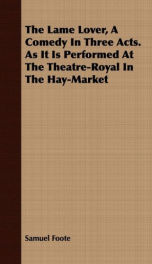
the lame lover a comedy in three acts as it is performed at the theatre royal
Series:
Unknown
Year:
Unknown
Raiting:
4.5/5
The Lame Lover, A Comedy In Three Acts - As It Is Performed At The Theatre-Royal In The Hay-Market - By Samuel Foote
Show more
add to favoritesadd In favorites
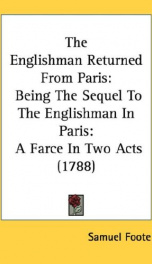
the englishman returned from paris being the sequel to the englishman in paris
Series:
Unknown
Year:
Unknown
Raiting:
3/5
Show more
add to favoritesadd In favorites

the dramatic works of samuel foote esq volume 4
Series:
Unknown
Year:
Unknown
Raiting:
2.5/5
Show more
add to favoritesadd In favorites

the dramatic works of samuel foote esq volume 3
Series:
Unknown
Year:
Unknown
Raiting:
4.5/5
Show more
add to favoritesadd In favorites

the dramatic works of samuel foote esq volume 2
Series:
Unknown
Year:
Unknown
Raiting:
5/5
Show more
add to favoritesadd In favorites

the dramatic works of samuel foote esq volume 1
Series:
Unknown
Year:
Unknown
Raiting:
3.5/5
Show more
add to favoritesadd In favorites

the devil upon two sticks a comedy in three acts
Series:
Unknown
Year:
Unknown
Raiting:
4.5/5
Show more
add to favoritesadd In favorites
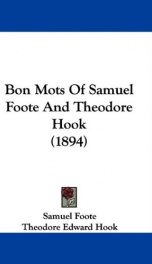
bon mots of samuel foote and theodore hook
Series:
Unknown
Year:
Unknown
Raiting:
3.5/5
With Grotesques By Aubrey Beardsley.
Show more
add to favoritesadd In favorites
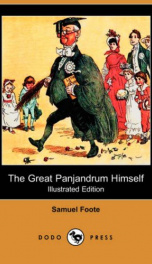
The Great Panjandrum Himself
Series:
Unknown
Year:
Unknown
Raiting:
5/5
One of a series of classic Victorian children's books by the British artist and author. Caldecott was the eponym of the Caldecott Medal and transformed the world of children's books in the Victorian era. He exercised his art chiefly in book illustrations, which were full of life, and instinct with a kindly, graceful humour. The stories and rhymes were all of his choosing and in some cases were written or added to by himself.
Show more
add to favoritesadd In favorites
What readers are saying
What do you think? Write your own comment on this author!
write a commentif you like Foote Samuel try:
readers also enjoyed
What readers are saying
What do you think? Write your own comment on this author!
write a commentGenre
if you like Foote Samuel try:
readers also enjoyed
Do you want to exchange books? It’s EASY!
Get registered and find other users who want to give their favourite books to good hands!
